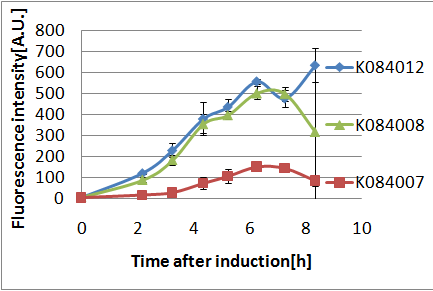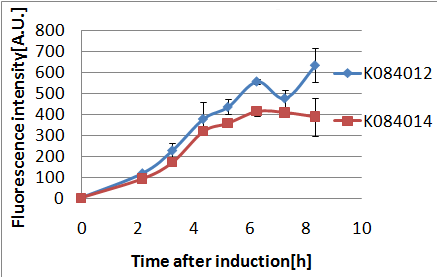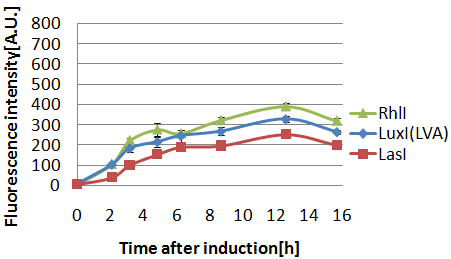Team:Chiba/Sender experiments/Senders(XL10Gold) T9002(JW1908)
From 2008.igem.org
(→Sender culture:500μL,Receiver culture:500μL) |
(→Reaction temparature:25°C) |
||
| Line 76: | Line 76: | ||
大きいと考えられる | 大きいと考えられる | ||
| - | ===Reaction temparature: | + | ===Reaction temparature:25c°=== |
====Sender culture:500μL,Receiver culture:500μL==== | ====Sender culture:500μL,Receiver culture:500μL==== | ||
| - | [[Image:Chiba_talks_XL10Gold_25_RS1_01.gif|thumb|left|'''Fig.8''' <br>E.coli strain,Senders:XL10Gold,BBa_T9002:JW1908, | + | [[Image:Chiba_talks_XL10Gold_25_RS1_01.gif|thumb|left|'''Fig.8''' <br>E.coli strain,Senders:XL10Gold,BBa_T9002:JW1908,25c°,Receiver cells/Sender cells = 1.]] |
[[Image:Chiba_talks_XL10Gold_25_RS1_02.gif|thumb|left|'''Fig.9''' <br> E.coli strain,Senders:XL10Gold,BBa_T9002:JW1908,25°C,Receiver cells/Sender cells = 1.]] | [[Image:Chiba_talks_XL10Gold_25_RS1_02.gif|thumb|left|'''Fig.9''' <br> E.coli strain,Senders:XL10Gold,BBa_T9002:JW1908,25°C,Receiver cells/Sender cells = 1.]] | ||
<br clear=all> | <br clear=all> | ||
*Left: | *Left: | ||
**result | **result | ||
| - | ***The value of fluoroscence intensity by LuxI, RhlI, LasI gene at | + | ***The value of fluoroscence intensity by LuxI, RhlI, LasI gene at 25c° were almost the same as negative control at 30 and 37c°. |
***The last value of fluoroscence intensity by LasI gene was a half of LuxI and RhlI. | ***The last value of fluoroscence intensity by LasI gene was a half of LuxI and RhlI. | ||
**Discussion | **Discussion | ||
| - | *** | + | ***蛍光強度が極端に下がったのは30c°,37c°で行った実験と比べ温度が低いため活性が落ちたためと考えられる。 |
***またそれだけではなく静置して行ったためSenderとReceiverがよく混ざらず、その結果GFPの発現量が大幅に減少した可能性も考えられる。 | ***またそれだけではなく静置して行ったためSenderとReceiverがよく混ざらず、その結果GFPの発現量が大幅に減少した可能性も考えられる。 | ||
Revision as of 06:35, 30 October 2008
| Home | The Team | The Project | Parts Submitted to the Registry | Reference | Notebook | Acknowledgements |
|---|
Results
Reaction temparature:37°C
- Sender culture:500μL,Receiver:500μL
- result
Cultures containing cells transformed with LuxI gene([http://partsregistry.org/Part:BBa_K084012 BBa_K084012])and cells transformed with RhlI gene([http://partsregistry.org/Part:BBa_K084008 BBa_K084008]) express gfp and fluorescence intensity was reached to 500.Cultures containing cells transformed with LasI gene([http://partsregistry.org/Part:BBa_K084007 BBa_K084007]) weakly expressed gfp,and fluorescence intensity was not reached to a significant level.
- Discussion:Maximum fluorescence intensity was vary,however,time before gfp expression doesn't differ.
- We concluded that LasI gene([http://partsregistry.org/Part:BBa_K084007 BBa_K084007]) was not work well at this condition.
middle
- Results
Fluorescence intensity of the culture containing cells transformed with LuxI gene([http://partsregistry.org/Part:BBa_K084012 BBa_K084012]) was lower than that of the cultures containing the cells transformed with LVA LuxI-LVA gene([http://partsregistry.org/Part:BBa_K084014 BBa_K084014]).The difference of maximum fluorescence intesity between the two cultures was 200.
- Discussion
- The rate of AHL synthesis decreased by the degradation of autoinducer synthase,however,the length of time before gfp expression is same.
- right
- Result
Cultures containing cells transformed with RhlI gene([http://partsregistry.org/Part:BBa_K084008 BBa_K084008]) and RhlI+LVA([http://partsregistry.org/Part:BBa_K084009 BBa_K084009]) draw the same transfer curve.
- Discussion
- We concluded that there was no effect of LVA-tag on time before gfp expression.
Reaction temparature:30°C
- Sender culture:500μL, Receiver culture:500μL
- Fig. 6
- Result
- The highest maximum fluorescence intensity was caused by RhlI gene,followed by LuxI(with LVA) and LasI gene.
- Fluorescence intensity of the two culture containing cells transformed with LuxI gene and RhlI gene amount to 200 for 2 hour as fast as LasI gene.
- Discussion
- Maximum fluorescence intensity caused by RhlI gene was higher than that caused by LuxI gene.There are two reasons:
- RhlI was more active at this experimental condition.
- LuxI was well degraded by protease.
の活性のほうがLuxIより高い。もしくは、LVAの効果が出ている。その場合、右のグラフ のLVA自体に問題があると考えられる。
- Fig. 7
- Result
- Comparing RhlI with Rhl+LVAtag, fluoroscence intensity were almost same.
- 考察
- LVAが働いていないか、働いていたとしてもこの条件だとAHLシンターゼの合成速度のほうがLVAによるLuxIの分解速度よりも
大きいと考えられる
Reaction temparature:25c°
Sender culture:500μL,Receiver culture:500μL
- Left:
- result
- The value of fluoroscence intensity by LuxI, RhlI, LasI gene at 25c° were almost the same as negative control at 30 and 37c°.
- The last value of fluoroscence intensity by LasI gene was a half of LuxI and RhlI.
- Discussion
- 蛍光強度が極端に下がったのは30c°,37c°で行った実験と比べ温度が低いため活性が落ちたためと考えられる。
- またそれだけではなく静置して行ったためSenderとReceiverがよく混ざらず、その結果GFPの発現量が大幅に減少した可能性も考えられる。
- result
- Right:
- Result
- The fluoroscence intensity by RhlI with LVAtag is less than RhlI without LVAtag.
- Discussion
- LVAtag is effective in this condition.
- Result
|Back to Sender experiment and result
 "
"









